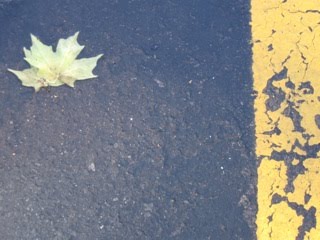“The difference between misery and happiness depends on what we do with our attention.”
-Sharon Salzberg
If you can pay attention to your mind during the day, to where you are placing it, to the thoughts running in and out, you will discover something. You will discover your story. It is the thought you turn to again and again when you are feeling hassled by things, when your back is up against the wall. You probably turn to it even when you are feeling pretty good about everything, happy even. In those cases, it is usually a kind of nagging little fear that will raise its head. When you are really stressed out, or trying to get something done, your children out the door, the dinner ready, whatever - going forward with your agenda - and it is not happening easily - the eggs fall out of the fridge and break on the floor, your youngest poops his pants as you are getting him in the car seat, you get the phone call saying you haven't gotten the job- your story might even slip right out of your mouth, verbalized for all to hear. What do you say to them, to yourself?
With the last months being so stressful for us, full of so much heartbreak, I have found my story slipping out. It came out this morning in the seemingly simple task of getting my three year old and my 20 month old out the door to the library. I can't even remember the series of events that made this outing seem akin to climbing the Himalayas barefooted, but after yet another delay caused by some act of typical toddler behavior or potty learning adventure I said, aloud, "I just can't catch a break."
It is the same sentence I said aloud to my husband in the days after learning about my miscarriage, as I tried to prepare for my three year old's party, and a dozen eggs slid from their perch in the fridge and broke all over the newly mopped floor minutes before guests began arriving. "I just can't catch a break."
It is a sentence I have been repeating to myself for what seems like all of my life. "I can't catch a break, I can't catch a break, I just can't catch a break!" With meditation practice, I finally noticed it, finally really heard what I have been spending years telling myself. When I was home with my parents last month briefly, I heard the same sentence and its variations uttered many times by my father. I doubt he has ever really, truly noticed this story flying from his lips with such regularity.
We all have our particular story. Often, it is a story we first heard from our own parents, or perhaps it was given to us by another authority figure or maybe we came up with it all by ourselves. In any case, it doesn't serve us. It isn't true. It is a story, just that, and since we have been writing it, we can also rewrite it.
It depends, as Ms. Salzberg says, on where we place our attention. When we hear ourselves telling our particular story to ourselves or to others, we can stop. We can notice what is going on with our bodies, our breath. What are we feeling? Where are we? What is actually happening in this particular moment? Things as they are do not conspire against us, although that may be how we feel. Things just are, true, variable, moving, changing, vivid. If we drop the story, we may actually really see, really perceive what is actually happening in any given situation, what the phenomena is truly communicating to us. The world is not for or against us. Things and beings are all dancing, shifting, arising and ceasing in an enormous interconnected dance. What are we choosing to tell ourselves about it? It is important where we put our minds and what words we choose - the story we tell. Can we recognize it as a story? Or do we call it the truth?
When we sit in meditation practice, we notice the tricks we play on ourselves, the wild tales we tell that keep us hooked, deceived, yo-yoing up and down. The more we sit and just let those stories go, not feeding them, not pushing them away, just letting them flow through and continually dropping them, dropping them, dropping them, the more space we create and the more we can laugh. Laugh at what we have been telling ourselves for so long.
Byron Katie has a powerful book of her work entitled "What Would You Be Without Your Story?" It is full of dialogues between her and different students, all with a powerful story that they have spent many years placing their minds on, again and again, with great emotion and intent. In the simple conversations with her, these stories fall apart, get flipped on their heads, and the people become so much freer. They no longer believe them.
This is what I am working on this week. Noticing my story. Catching when I am telling it to myself or others. Dropping it. Touching it. Asking myself, "Is this really true?" And placing my mind again on the present moment. I don't want to give this story to my children. I would rather they tell themselves the vivid truth of basic goodness, again and again, rather than this lie of "I can't catch a break."
Subscribe to:
Post Comments (Atom)


No comments:
Post a Comment